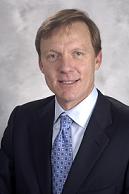 Theodore Schlegel, MD, board-certified orthopedic surgeon, is a founding partner and fellowship director of the Steadman-Hawkins Clinic Denver (Colo.). He currently serves as the team physician for the Denver Broncos and Colorado Rockies. Dr. Schlegel is also a clinical assistant professor of orthopedics at the University of Colorado School of Medicine in Denver. He has expertise in sports medicine and knee and shoulder injuries.
Theodore Schlegel, MD, board-certified orthopedic surgeon, is a founding partner and fellowship director of the Steadman-Hawkins Clinic Denver (Colo.). He currently serves as the team physician for the Denver Broncos and Colorado Rockies. Dr. Schlegel is also a clinical assistant professor of orthopedics at the University of Colorado School of Medicine in Denver. He has expertise in sports medicine and knee and shoulder injuries. Q: What attracted you to the field of orthopedics?
Dr. Theodore Schlegel: I was looking for a career that blended the ability to serve others, that was intellectually challenging and incorporated my interest in an active lifestyle.
Q: Have you always been interested in pursuing sports medicine?
TS: My interest in sports medicine dates back to college when I was playing water polo in the summers with UCLA. There, I met Dr. Jim Puffer who was the Chief Medical Officer for the 1984 United States Olympic Team who introduced me to this new subspecialty. This led to my desire to pursue a career in medicine. While in medical school, I had the opportunity to work with Dr. Frank Noyes who provided further confirmation that I would be constantly stimulated in this specialty because of the ongoing source of new challenges, and consequently new research opportunities.
Q: Are there currently any new developments in the field of orthopedics and sports medicine that you are excited about?
TS: After recently completing a study where we used stem cells to enhance tendon healing, I am optimistic about the potential of biologic solutions for difficult clinical problems in sports medicine.
Q: How has your experience with treating professional athletes contributed to your sports medicine subspecialty?
TS: Caring for professional athletes has provided me with an exposure to a wide array of injuries which has resulted in a greater understanding for treatment of the general population's orthopedic conditions.
Q: What do you think are the major forces driving change in orthopedics and sports medicine?
TS: The focus of healthcare delivery in the future, regardless of the field of medicine and area of specialty, will be to provide the highest quality of care at the lowest possible price. Although I am focusing some of my research effort on cost-effectiveness of treatment alternatives for sports-related conditions, I am concerned about patient satisfaction as it relates to the long term relationship built between doctor and patient.
A series of articles featuring orthopedic surgeons on issues ranging from personal background to current research developments is published weekly. We invite all orthopedic surgeons and sports medicine specialists to participate.
If you are interested please email cpallardy@beckershealthcare.com.
More Articles on Sports Medicine:
Problem Solving & Moving Forward in the Field of Orthopedics: Q&A With Dr. Michael Wilmink or Arizona Orthopaedic Associates
Achieving Goals With Orthopedic Care: Q&A With Dr. Jeffrey Carlson of Orthopaedic & Spine Center
Arthroscopy, Minimally Invasive Surgery and Orthopedic Innovation: Q&A With New York Orthopedic Surgeon Dr. Howard Levy


